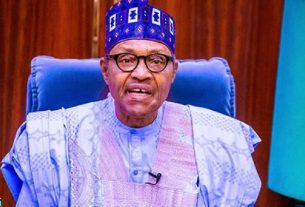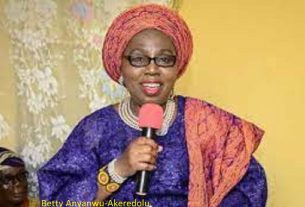Bola Tinubu, Nigeria’s president, on day two of the COP28 climate conference at Expo City in Dubai, United Arab Emirates, on Friday, Dec. 1, 2023. More than 70,000 politicians, diplomats, campaigners, financiers, and business leaders will fly to Dubai to talk about arresting the world’s slide toward environmental catastrophe. (Photo AFP)
That the administration of President Bola Tinubu allowed a huge number of 1,411 delegates to represent Nigeria at the COP28 climate change conference in Dubai, United Arab Emirates (UAE) is unacceptable. It reeks of an international advertisement of reckless spending and misplaced priority by a country running on seemingly endless borrowing.
It is particularly distressing that despite wise counsel by Nigerians and friends of Nigeria that the country should cut the cost of governance, stop frivolous spending and channel the nation’s resources to projects and programmes that will have direct bearing on the well-being of the pauperized masses to mitigate the effect of the economic hardship in the country, the Federal Government could continue to toe the condemned path of previous administrations that made the country to lose its vision and direction. Consequently, Nigeria has become a heavily indebted country, and nothing seems to work, a situation that has thrown the majority of the citizens into abject poverty. This is just one of the unacceptable spending in recent times that indicates gross insensitivity to the suffering of the citizens.
Of the 1,411 delegates, 590 were government delegates, and this is unreasonably huge. For this number, the flight tickets alone, to and from the event, is estimated to cost N885 million. And the delegates are entitled to estacodes. Though the government claimed that only 422 were sponsored, there is no justifiable reason to have a large number of delegates for a nation borrowing to fund its budget and profligate lifestyle.
That is absurd, for a country reeling in debts. National resources have been fraudulently cornered by a few powerful citizens who care not whether their fellow citizens live or die. Even the meager money in the national coffer is not being used to improve on the dismal living standards of the people.
For peace, stability, and genuine development, the Tinubu administration should stop wasteful spending and get serious with the task of getting Nigeria out of the woods. The 13-day COP28, which started on November 30 and ended on December 12, is just a forum where governments agree on policies to limit the rise of global temperature and adapt to impacts associated with climate change.
The defence by the Senior Special Assistant to President Tinubu on Media and Publicity, Temitope Ajayi, that the Nigeria’s delegation needed to be large because Nigeria is the biggest country and economy in Africa; one with a bigger stake in climate action and huge extractive economy, cannot win the sympathies of millions of Nigerians that are bearing the brunt of the sacrifices that this administration asked them to make so that Nigeria can be a country again. This is the reason it elicited condemnation from many quarters.
It is unfortunate that the government has not recognised the need to reduce the cost of governance, even when it has to borrow almost 100 percent to fund its 2024 budget. The country is planning to spend N27.5 trillion in 2024, out of which non-debt recurrent expenditure is N9.92 trillion while debt service is projected to be N8.25 trillion and capital expenditure is N8.7 trillion.
A responsible government cannot continue to spend recklessly at a time that calls for austerity. The major polluters of the world are the developed countries. Leaders should focus on the future of this country and, for once, begin to think about how to successfully tackle the challenges that slow down Nigeria’s progress. They must think deeply to ascertain what to do as a country to move forward and be able to compete with other countries across the world. Nigerian leaders travel across the world intermittently to seek foreign investors that will come and invest in Nigeria, but do they think about what should be on ground to attract foreigners? The people being persuaded to come to Nigeria understand the realities in Nigeria more than Nigerians themselves. They are people from countries where there is high value for human life, stable power supply for businesses to flourish, government economic policies help businesses to thrive, among others.
Nigeria needs to have these basics to successfully attract foreign investors. Big companies, including GSK, P&G, Evans Medical, Unilever and PZ that employed thousands of Nigerians are exiting the country and throwing a large number of more Nigerians into the already saturated job market. The political leaders should think deeply. The Tinubu administration should do things that will show that Nigerians have a future. So far, government rhetoric has done little to give Nigerians real hope of a bright future. Things are getting hard by the day, in contrast to the government’s regular promise to the nation. Leaders must be ready to walk their talk.
In other countries, preparation for such a summit would have been handled strategically to determine who is really relevant to attend the summit. And public expenditure should have been tailored to many development projects that are begging for attention and completion in the country.
The plight of the majority of Nigerians who are suffering seriously on account of the harsh economy, particularly since the removal of subsidy on petrol, ought to dominate the leaders’ actions and thoughts. Millions of Nigerians can no longer feed and house themselves. They are withdrawing their children from schools for lack of means to pay their fees which have been increasing. The education and health institutions are becoming dysfunctional due to poor funding and the exodus of the personnel to foreign countries in search of greener pastures; no stable electricity supply after over 60 years of independence, and none of the four refineries is working. It is a tale of woes!
Sadly, it is amid this horrible situation in the country that the government at federal and state levels indulged in wasteful spending that dampens enthusiasm for a better Nigeria that the Tinubu administration promised. The president has a responsibility to prove to Nigerians that his administration is responsible and has the capacity to extricate itself from the condemned ‘business as usual’ practice in governance that is slowing down the nation’s progress and making life miserable for the people.
The Guardian





